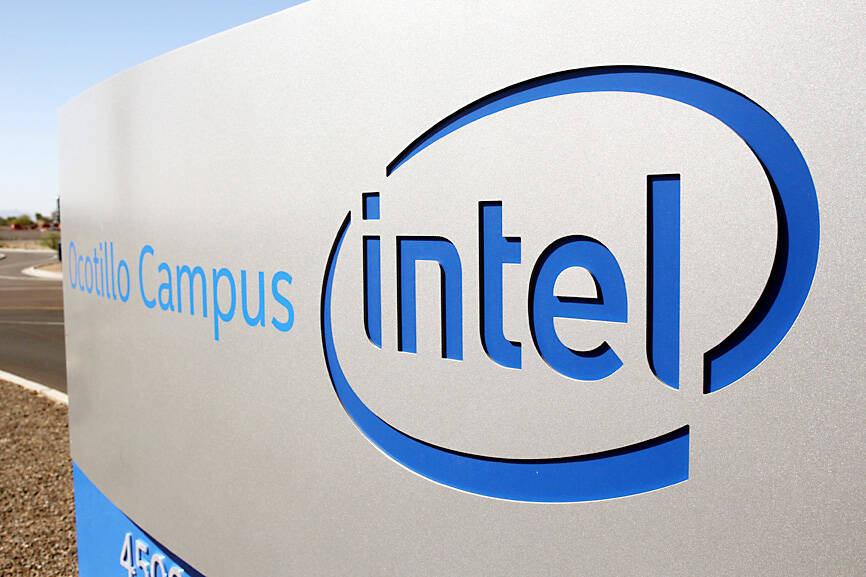Intel Corp has started evaluating a handful of outsiders, including former board member Tan Lip-bu (陳立武), for the role of chief executive after the struggling US chipmaking icon ousted company veteran Pat Gelsinger, according to people familiar with the matter.
Tan, a well-respected semiconductor industry veteran who has long been seen as a contender for CEO at Intel, has been approached by Intel’s board in recent days to gauge his interest in taking up the job, the sources said.
Intel’s board is mostly evaluating outsider candidates for the role and has also approached Marvell Technology Group Ltd CEO Matt Murphy, two of the sources said.

Photo: REUTERS
The deliberations on the CEO succession are at an early stage, the sources said, cautioning that Intel has not yet zeroed in on any candidate to replace Gelsinger, who stepped down from his role on Monday after being given the choice to retire or be removed.
The board has formed a search committee for Gelsinger’s successor and is expected to make a final decision on his replacement in the coming months, the sources said.
The company on Monday named chief financial officer David Zinsner and senior executive Michelle Johnston Holthaus as interim co-CEOs.
Intel declined to comment. Representatives for Tan’s venture capital firm, Walden Catalyst Management LLC, did not respond to a request for comment.
The hunt for Intel’s next leader is one of the most closely watched CEO successions in the US and comes at a pivotal time for the ailing chipmaker, which is enduring one of the bleakest periods in its five-decade history.
Intel’s revenue shriveled to US$54 billion last year, down nearly one-third from the year Gelsinger took over as CEO in 2021. Analysts expect Intel to lose US$3.68 billion this year, its first annual net loss since 1986.
The company’s shares were down nearly 6 percent on Tuesday, off more than 60 percent from a peak hit in Gelsinger’s first months as CEO. The crash in Intel’s share price had sparked takeover interest from suitors such as Qualcomm Inc, Reuters has reported.

Greek tourism student Katerina quit within a month of starting work at a five-star hotel in Halkidiki, one of the country’s top destinations, because she said conditions were so dire. Beyond the bad pay, the 22-year-old said that her working and living conditions were “miserable and unacceptable.” Millions holiday in Greece every year, but its vital tourism industry is finding it harder and harder to recruit Greeks to look after them. “I was asked to work in any department of the hotel where there was a need, from service to cleaning,” said Katerina, a tourism and marketing student, who would

i Gasoline and diesel prices at fuel stations are this week to rise NT$0.1 per liter, as tensions in the Middle East pushed crude oil prices higher last week, CPC Corp, Taiwan (台灣中油) and Formosa Petrochemical Corp (台塑石化) said yesterday. International crude oil prices last week rose for the third consecutive week due to an escalating conflict between Israel and Iran, as the market is concerned that the situation in the Middle East might affect crude oil supply, CPC and Formosa said in separate statements. Front-month Brent crude oil futures — the international oil benchmark — rose 3.75 percent to settle at US$77.01

Merida Industry Co (美利達) has seen signs of recovery in the US and European markets this year, as customers are gradually depleting their inventories, the bicycle maker told shareholders yesterday. Given robust growth in new orders at its Taiwanese factory, coupled with its subsidiaries’ improving performance, Merida said it remains confident about the bicycle market’s prospects and expects steady growth in its core business this year. CAUTION ON CHINA However, the company must handle the Chinese market with great caution, as sales of road bikes there have declined significantly, affecting its revenue and profitability, Merida said in a statement, adding that it would

UNCERTAINTIES: The world’s biggest chip packager and tester is closely monitoring the US’ tariff policy before making any capacity adjustments, a company official said ASE Technology Holding Inc (日月光投控), the world’s biggest chip packager and tester, yesterday said it is cautiously evaluating new advanced packaging capacity expansion in the US in response to customers’ requests amid uncertainties about the US’ tariff policy. Compared with its semiconductor peers, ASE has been relatively prudent about building new capacity in the US. However, the company is adjusting its global manufacturing footprint expansion after US President Donald Trump announced “reciprocal” tariffs in April, and new import duties targeting semiconductors and other items that are vital to national security. ASE subsidiary Siliconware Precision Industries Co (SPIL, 矽品精密) is participating in Nvidia